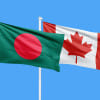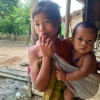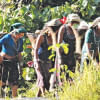Thanchi people suffering from food shortage

Rui Mon Mro, aged over 80, began to worry about her five grandchildren after her family living in a remote area of Bandarban had run out of food.
She experienced food shortage in the previous years as well but this time it got worse, she said.
Like Rui's, some 1,500 families of Mro, Khumi, Marma and Tripura communities in Thanchi upazila have been facing a severe food crisis as they could not cultivate enough jhum crops for their families last year due to incessant rain. Adding to their misery, a large portion of the crops they grew was damaged by insects and rats.
Rui lives with seven other family members in Yon Nong Karbari Para deep inside Remakri union of the upazila. People have to go by boat from the upazila for around four hours and then have to walk for two hours to reach there.
“My family has been half-fed for days. Sometimes we eat jungle potatoes, sometimes we starve. The situation is like this for the last two months.
“Now, we don't have any food left to survive.”
Indigenous people in remote Bulupara, Tindu, Remakri, Boro Madok and Choto Madok of the upazila alleged that no one, including officials from the district agricultural department, visited the affected areas yet.

Mya Sa Ching Marma, a septuagenarian woman of Boro Madok Vitor Para, said they had been subsisting on jungle potatoes for two months.
“Now those potatoes are also rare to find. How will we survive as we have no food at home?
The physical condition of her grandchildren deteriorated alarmingly, she said.
Adui Mro, of Yon Nong Karbari Para, said he could not cultivate enough crops for his family due to heavy rain last year.
“Besides most of my jhum fields were affected by insects and rats.”
Nobody has been paying heed to their misery, said Biren Tripura of Japarang Tripura Para.
Mong Pru Aung, chairman of Tindu union, said around 800 families of the union were suffering from a scarcity of food.
“Most of the people of my union will starve to death if not provided with food urgently,” he said.
People of these remote areas are not covered by the government's development programmes, and non-government organisations find it difficult to reach there due to lack of communication networks, sources said.
The inhabitants of these places depend on jhum crops for food.
Talking to The Daily Star, Kwe Shwe Hla, chairman of Bandarban Hill District Council, spoke of a similar situation in those areas.
Bandarban Deputy Commissioner Dilip Kumar Banik said the authorities had already allocated 16 tonnes of food for the affected people.
“We will provide more food for the families. I already told the UNO [upazila nirbahi officer], UP [union parishad] chairman and others of the local administration to reach the affected areas as soon as possible with food.”
Altaf Hossen, deputy director of the agricultural extension department, said people of Chittagong Hill Tracts face food crisis every year as rats destroy their fields, but this year the situation became grave since indigenous people could not cultivate sufficient food because of rough weather.

 For all latest news, follow The Daily Star's Google News channel.
For all latest news, follow The Daily Star's Google News channel. 








Comments